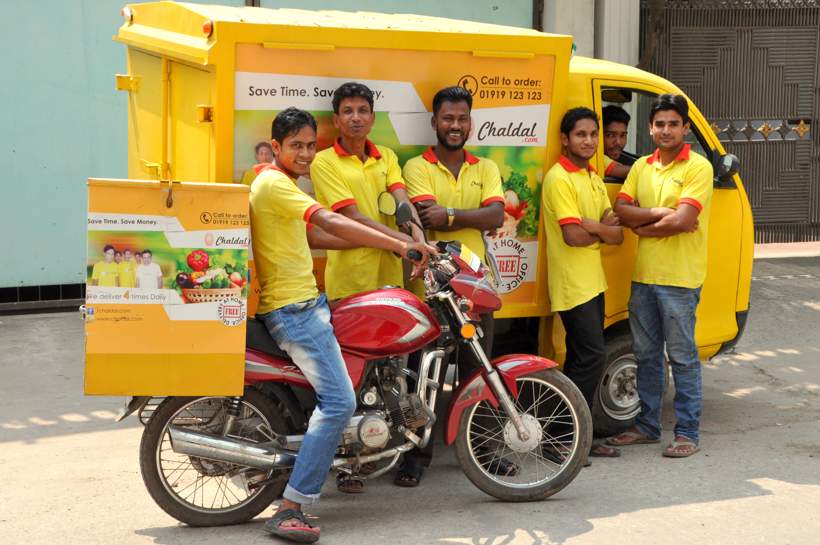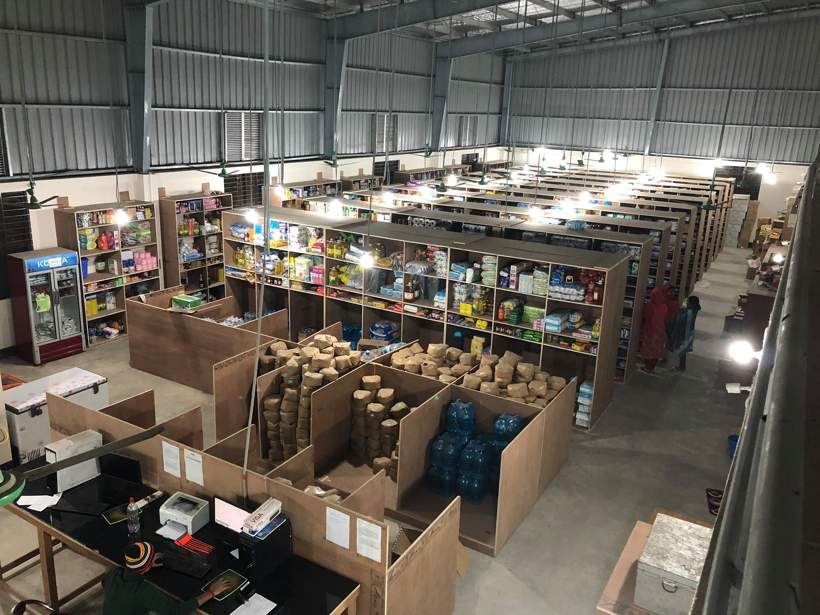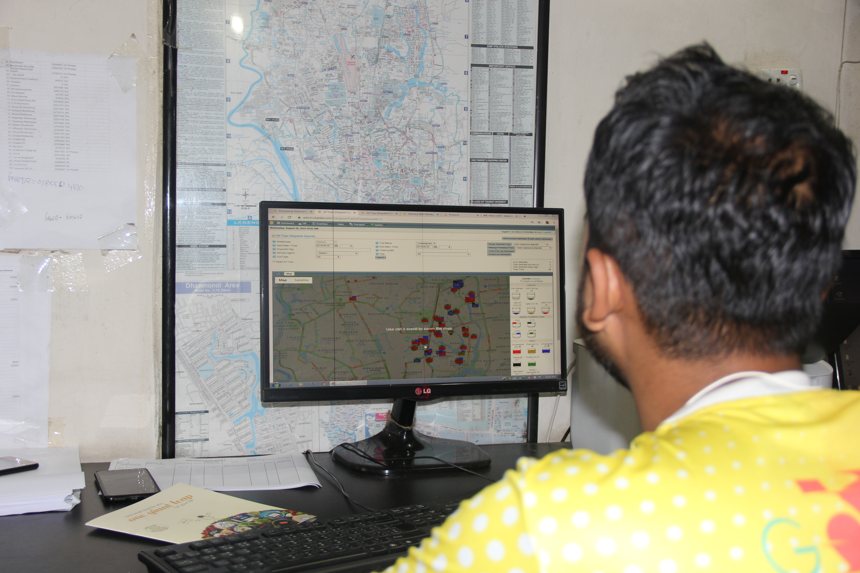
A very brief history of grocery. Grocery distribution, from the outside, may look archaic in Bangladesh. But changes have been taking place, albeit slowly, for years. Once wet markets and raw groceries were the only options consumers had. You go to these local bazaars and pick groceries you want to buy. Many complain about the challenges. But it remains the dominant mode of grocery shopping even these days for reasons such as competitive pricing, fresh produce, experience, and most of all, the resistance to change.
Eventually supermarkets and organized retail such as Agora, Shwapno, and Meena Bazar came along and grocery shopping got upgraded. Customers in these shops now can browse groceries themselves rather than asking someone behind a counter. The organized retail has received meaningful prominence among the urban upper-class and to some extent the burgeoning middle-class in Dhaka. But the reach of these stores remains limited.
Format-wise, things remained reasonably static until the online grocery came along as a viable alternative in around 2012/2013. Chaldal, the first serious online grocery delivery company in the country, was founded in 2013 as a small operation handling grocery delivery in a few small pockets in Dhaka. The company has been deliberate about expansion given the relatively slow adoption and complex nature of the online grocery business. Delivering fresh produce at a margin is not an easy job.
Things, however, are changing. Chaldal has consistently expanded its coverage in the past two years. After covering all of Dhaka, the company expanded to Naraynganj last year and to Chittagong and Jashore in 2021. Other digital commerce players are showing interest in the vertical. Evaly, Daraz, FoodPanda all have significant grocery operations today.
II. The rise of online grocery shopping. Online grocery adoption is increasing worldwide and Bangladesh is no different. Increased mobile phone and internet penetration, tailored features, valuable promotions, and same-day delivery all add excellent value to the customer.
Consider Chaldal, the leading online grocery startup in Bangladesh we mentioned at the beginning of this story, the company claims it has served some 700,000+ families in 2020 in three cities: Dhaka, Narayanganj, and Cox’s Bazar — the company has since expanded to Chittagong and Jashore — and delivered some 12,000,000+ KGs rice and 15,000,000+ eggs among other fascinating accomplishments.
The coronavirus pandemic has accelerated the growth of online shopping, particularly grocery, bringing a new wave of consumers online. While this is a new thing, this has been a long time coming. What the pandemic has done is that it has accelerated the growth and brought ahead the future of ecommerce by a few years.
This surge of digital shopping has brought forward a new understanding of online shopping and its upsides to many people. Consumers who were reluctant to try online shopping came to rely on online shopping for everything, from medicine, healthcare to the grocery. A survey conducted by the Need Assessment Working Group (NAWG) suggests: for 66% of Bangladeshi people the main challenge during the early days of pandemic lockdown was closed markets.
Platforms like Chaldal quickly became an alternative to a large number of people looking to purchase daily essentials amid the coronavirus lockdown.

III. Skeptics and optimists. There are a large number of skeptics of the online grocery model. Some believe online grocery shopping is a niche service for time-starved, affluent, and tech-savvy audiences who want a wider collection or simply avoid the hassles of grocery shopping. We also read that consumers like the experience of going to the store to buy groceries.
However, recent data suggests that the appeal is much broader and the value proposition much greater and relevant for many of the population. From a customer's perspective, there are good reasons to try online grocery.
Done right, online grocery can provide immense value to consumers. The coronavirus pandemic has proven the point many times.
In this light exploration, we analyze some of the benefits of online grocery shopping, quirky and otherwise. Let’s dive in.
1/ Online shopping is cheaper in real numbers. Case in point, when onion price went over the roof last year, Chaldal managed to keep the price under control using a combination of supply coordination, demand prediction, and clever pricing mechanisms. Even in regular times, online grocery shops like Chalda offer competitive pricing.
2/ Take the case of a married couple. Husband and wife both work full-time. They are already time-starved and hardly get time for each other. One of them spending more time shopping groceries after work means even less time for themselves. For them, shopping online could be a godsend. To that end, services such as Chaldal could save you time to do what you want to do. The benefit of large collections is the icing on the cake.
3/ If you live abroad, have elderly parents in Dhaka and don’t want them to go out amid a raging pandemic outside, online shopping could be an incredibly useful service. Online shopping allows you to shop from anywhere. For example, Chaldal allows expats living abroad to shop for their families and pay using international cards while their parents/family can stay home safe.
4/ One of the things about grocery shopping is that at times you need them quickly. Chaldal now offers one-hour deliveries in multiple cities. It means you can shop for groceries the way you always wanted to, without planning, stocking up, or bulk shopping. You can shop whenever you want and in whatever quantity you prefer. On top of it, home delivery is a benefit that we can all take advantage of. Carrying diapers every day might not be an experience you would like to enjoy when you could get them delivered to your home using services like Chaldal.
5/ Offline shopping rarely comes with return options. Unlike offline stores, if you buy rotten or expired goods online, you can return them within a certain period. For instance, Chaldal has a one-day return policy for unopened and spoiled products.
6/ One recent study suggests that we tend to order healthier foods when shopping online than when shopping at the store. Perhaps because we are focused and have a list of priorities. Many of the things we buy, mostly items like sweets and snacks, are impulse purchases and they are more lucrative and tempting when we are shopping at a store.

IV. Fast delivery and competitive price. The technological advances in customer management, data analytics, warehousing, and logistics solutions are likely to make online grocery a superior value proposition and relevant solution to a greater number of customers in the coming days.
Take, for example, Chaldal, the leader in the grocery space, has been investing consistently in data and infrastructure to improve both the pricing and customer experience. The company currently has some 20 micro warehouses between Dhaka, Narayanganj, and Chittagong. The micro warehouse model is part of Chaldal’s hyper-local strategy to ensure low cost faster delivery.
In an interview with Future Startup, Chaldal CEO Waseem Alim said the company made significant progress in ensuring one-hour delivery for a large number of customers: “We are at 97% on-time delivery. We are delivering 1% of the orders ahead of time and 2% of the deliveries slightly late. Our delivery quality has never been better. We are at a peak in terms of customer satisfaction and delivery timing. We certainly have room for improvement. We are relentlessly working there.”
Chaldal has designed technology solutions to crack some of the biggest problems a modern grocery retailer faces. They have come out with a real-time prediction tool — using a combination of smart algorithms and analytics based on the uptake of customers, historical data, weather data, major events, and so on. It can predict what product should arrive at what date and can automatically predict orders/demands and generates POs to alert the sourcing team to source products from its suppliers. “Take, for example, a customer places an order two days in advance which we will have to deliver two days from now, a grocery store in Dhaka can’t account for these two days and carry stock,” explains Emrul Kayes, a Director of Product Operations at Chaldal. “We need to build a system smart enough to take in the demand and make sure the item is available on the shelf right on the day of delivery. This requires smart algorithms which ensure better use of real estate in our warehouses.”
Price remains a key decision-making factor for most customers. Chaldal, over the years, has managed to establish a process to offer consistently competitive prices to customers using a combination of backward linkage through its vegetable network, market analysis, demand prediction, and designing intelligent offers.
“We do our own market check every day from multiple bazaars to make sure our prices are competitive,” says Mr. Emrul. “Now that we have expanded in other cities, this check is done across other cities and the website handles different prices for different cities.”
On top of these, marketing campaigns are run with offers which helps with customers pricing for a range of products. The company says the offer section of its website almost always has 50+ items on offer. There are special discounts. However, Chaldal has always tried to find a sustainable approach to offering consistent price benefits to customers.
The company extensively uses data and tech to optimize its operation to bring down costs in different areas of its operation, allowing Chaldal to offer consistently competitive prices. “We are focusing on improving our supply chain, which is increasingly becoming critical for us”, says Chaldal CEO Waseem Alim. “We are also paying a lot of attention to product quality and service. Product quality, on-time delivery, and service - these things remain a priority. We are obsessed with service quality. We used to be happy with 90% in the past. Our goal now is 99.9%. We want to offer a perfect product to our customers.”
